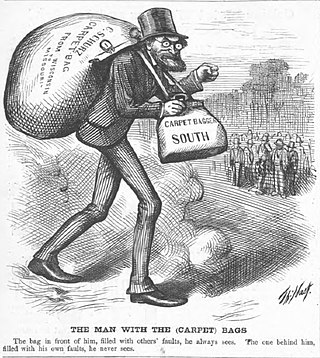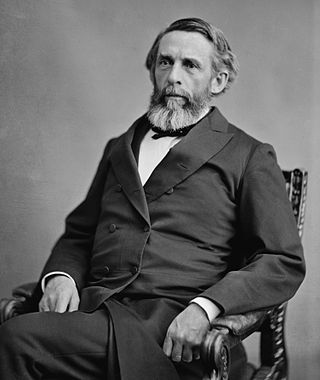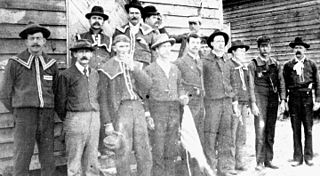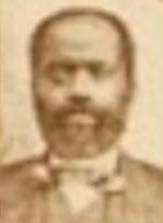
The Ku Klux Klan, commonly shortened to the KKK or the Klan, is the name of several historical and current American white supremacist, far-right terrorist organizations and hate groups. According to historian Fergus Bordewich, the Klan was "the first organized terror movement in American history." Their primary targets, at various times and places, have been African Americans, Jews, and Catholics.

The Reconstruction era was a period in United States history following the American Civil War, dominated by the legal, social, and political challenges of abolishing slavery and reintegrating the eleven former Confederate States of America into the United States. During this period, three amendments were added to the United States Constitution to grant equal civil rights to the newly freed slaves. Despite this, former Confederate states often used poll taxes, literacy tests, and intimidation to control people of color.
The Radical Republicans were a political faction within the Republican Party originating from the party's founding in 1854—some six years before the Civil War—until the Compromise of 1877, which effectively ended Reconstruction. They called themselves "Radicals" because of their goal of immediate, complete, and permanent eradication of slavery in the United States. The Radical faction also included, though, very strong currents of Nativism, anti-Catholicism, and in favor of the Prohibition of alcoholic beverages. These policy goals and the rhetoric in their favor often made it extremely difficult for the Republican Party as a whole to avoid alienating large numbers of American voters from Irish Catholic, German-, and other White ethnic backgrounds.

In the history of the United States, carpetbagger is a largely historical pejorative used by Southerners to describe allegedly opportunistic or disruptive Northerners who came to the Southern states after the American Civil War, and were perceived to be exploiting the local populace for their own financial, political, and/or social gain. The term broadly included both individuals who sought to promote Republican politics, and individuals who saw business and political opportunities because of the chaotic state of the local economies following the war. In practice, the term carpetbagger often was applied to any Northerners who were present in the South during the Reconstruction Era (1865–1877). The word is closely associated with scalawag, a similarly pejorative word used to describe native white Southerners who supported the Republican Party-led Reconstruction.

George Sewall Boutwell was an American politician, lawyer, and statesman from Massachusetts. He served as Secretary of the Treasury under U.S. President Ulysses S. Grant, the 20th Governor of Massachusetts, a Senator and Representative from Massachusetts and the first Commissioner of Internal Revenue under President Abraham Lincoln. He was a leader in the impeachment of U.S. President Andrew Johnson, and served as a House manager (prosecutor) in the impeachment trial.
The Redeemers were a political coalition in the Southern United States during the Reconstruction Era that followed the American Civil War. Redeemers were the Southern wing of the Democratic Party. They sought to regain their political power and enforce White supremacy. Their policy of Redemption was intended to oust the Radical Republicans, a coalition of freedmen, "carpetbaggers", and "scalawags". They were typically led by White yeomen and dominated Southern politics in most areas from the 1870s to 1910.
The Mississippi Plan of 1874-1875 was developed by white Southern Democrats as part of the white insurgency during the Reconstruction Era in the Southern United States. It was devised by the Democratic Party in that state to overthrow the Republican Party in Mississippi by means of organized threats of violence and voter suppression against African American citizens and white Republican supporters. Democrats sought to regain political control of the state legislature and governor's office 'peaceably if we can, forcibly if we must.' Their justifications were articulated on a basis of discontent with governor Adelbert Ames' Republican administration, including spurious charges of corruption and high taxes. However, the violence that followed was centred on the desire to return white supremacy to the state. The success of the campaign led to similar plans being adopted by white Democrats in South Carolina and other majority-black states across the South.

The Enforcement Act of 1871, also known as the Ku Klux Klan Act, Third Enforcement Act, Third Ku Klux Klan Act, Civil Rights Act of 1871, or Force Act of 1871, is an Act of the United States Congress that was intended to combat the paramilitary vigilantism of the Ku Klux Klan. The act made certain acts committed by private persons federal offenses including conspiring to deprive citizens of their rights to hold office, serve on juries, or enjoy the equal protection of law. The Act authorized the President to deploy federal troops to counter the Klan and to suspend the writ of habeas corpus to make arrests without charge.

In the 19th century, a number of new methods for conducting American election campaigns developed in the United States. For the most part the techniques were original, not copied from Europe or anywhere else. The campaigns were also changed by a general enlargement of the voting franchise—the states began removing or reducing property and tax qualifications for suffrage and by the early 19th century the great majority of free adult white males could vote. During the Reconstruction Era, Republicans in Congress used the military to create a biracial electorate, but when the troops were removed in 1877, blacks steadily lost political power in the increasingly one-party Southern United States. After 1890 blacks generally lost the vote in the South.

The Hamburg Massacre was a riot in the United States town of Hamburg, South Carolina, in July 1876, leading up to the last election season of the Reconstruction Era. It was the first of a series of civil disturbances planned and carried out by white Democrats in the majority-black Republican Edgefield District, with the goal of suppressing black Americans' civil rights and voting rights and disrupting Republican meetings, through actual and threatened violence.

The Third Party System was a period in the history of political parties in the United States from the 1850s until the 1890s, which featured profound developments in issues of American nationalism, modernization, and race. This period, the later part of which is often termed the Gilded Age, is defined by its contrast with the eras of the Second Party System and the Fourth Party System.

The 1876 South Carolina gubernatorial election was held on November 7, 1876, to select the governor of the state of South Carolina. The election campaign was a referendum on the Radical Republican-led state government and their Reconstruction policies. Opponents disputed the challenger Wade Hampton III's victory, gained by a margin of little more than 1100 votes statewide. But he took office in April 1877, after President Hayes withdrew federal troops as a result of a national Democratic compromise, and the incumbent Daniel Henry Chamberlain left the state.

The Red Shirts or Redshirts of the Southern United States were white supremacist paramilitary terrorist groups that were active in the late 19th century in the last years of, and after the end of, the Reconstruction era of the United States. Red Shirt groups originated in Mississippi in 1875, when anti-Reconstruction private terror units adopted red shirts to make themselves more visible and threatening to Southern Republicans, both whites and freedmen. Similar groups in the Carolinas also adopted red shirts.
The South Carolina civil disturbances of 1876 were a series of race riots and civil unrest related to the Democratic Party's political campaign to take back control from Republicans of the state legislature and governor's office through their paramilitary Red Shirts division. Part of their plan was to disrupt Republican political activity and suppress black voting, particularly in counties where populations of whites and blacks were close to equal. Former Confederate general Martin W. Gary's "Plan of the Campaign of 1876" gives the details of planned actions to accomplish this.
The civil rights movement (1865–1896) aimed to eliminate racial discrimination against African Americans, improve their educational and employment opportunities, and establish their electoral power, just after the abolition of slavery in the United States. The period from 1865 to 1895 saw a tremendous change in the fortunes of the Black community following the elimination of slavery in the South.

Prince R. Rivers was a former enslaved man from South Carolina who served as a soldier in the Union Army and as a state politician during the Reconstruction era. He escaped and joined Union lines, becoming a sergeant in the 1st South Carolina Volunteers, a Union regiment in the American Civil War.
Alexander Boyd was notable as the Republican County Solicitor and Register in Chancery of Greene County, Alabama in 1870 during Reconstruction who was murdered by a lynching party of Ku Klux Klan members. He was fatally shot on March 31, 1870 in Eutaw, the county seat. The Klan members apparently intended to hang him in the square in a public lynching, to demonstrate their power during this period and their threat to Republicans.

The 1966 United States Senate election in Mississippi was held on November 8, 1966.

John Hannibal White was a delegate to South Carolina's 1868 Constitutional Convention, a two-term member of the South Carolina House of Representatives, and a state senator in South Carolina. He worked as a blacksmith.
Allen Pardee Huggins (1839–1916) was a Union Army soldier, Freedmen’s Bureau official, sheriff, county school superintendent, tax official, and state legislator in Mississippi.













